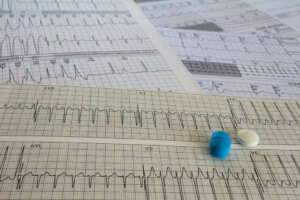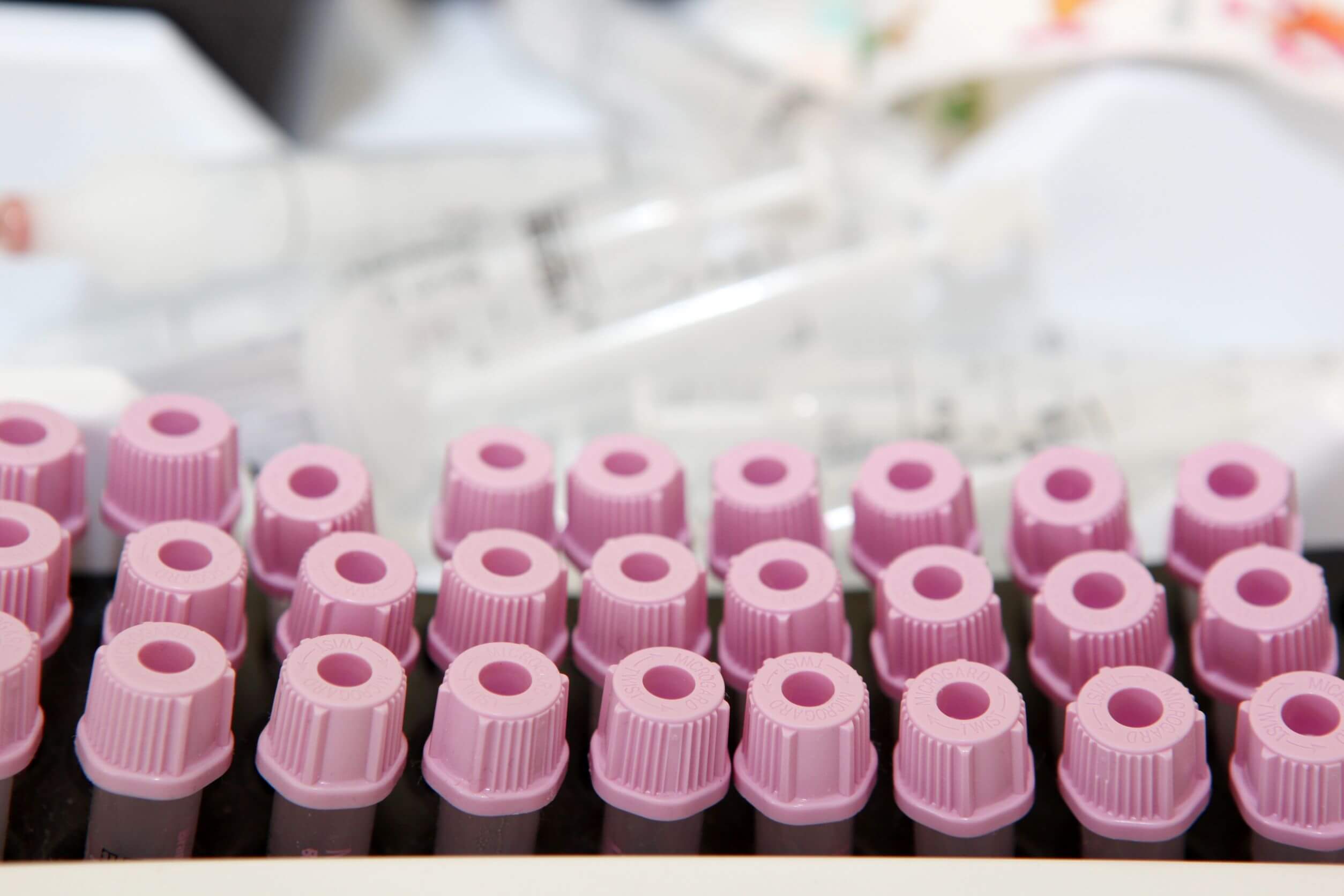What Is Hypomagnesemia?

Hypomagnesemia is a disorder characterized by low levels of magnesium in the blood. Electrolyte values generally range between 1.5 and 2.5 mg/dL in a healthy adult. When this condition occurs, they can drop to about 0.7 mmol/L. If left untreated, it can lead to severe or fatal complications.
It’s very common for it to develop alongside other electrolyte disorders, such as hypocalcemia (a decrease in calcium in the body) and hypokalemia (a reduction in potassium levels). Of course, it can also occur on its own. Today we’ll tell you everything about the condition: symptoms, causes, diagnosis and how to treat it.
Symptoms of hypomagnesemia

When the decrease in values isn’t so significant, the disorder usually doesn’t usually produce symptoms. A person can suffer from hypomagnesemia unknowingly, and it’s usually discovered in a routine examination or when the imbalance advances to a higher level. When this happens the following occurs:
- Sickness
- Vomiting
- Fatigue
- Anorexia
- Growth retardation (in children and young people)
- Muscle spasms
- Changes in mood
In some cases, especially with children, seizures can occur. If this isn’t treated correctly, it can cause disorders in different parts of the body that encourage the development of other symptoms. For example, it has been shown to cause hypertension and cardiovascular problems.
In fact, the evidence indicates that the main complication generated by hypomagnesemia is cardiac arrhythmias. Many studies indicate that low magnesium levels can also lead to preeclampsia, eclampsia, Alzheimer’s, and psychosocial disorders like ADHD. In this sense, the symptoms vary according to the development of the disease.
In addition, this condition can worsen certain previous conditions that the patient already has. For example, hypomagnesemia has been associated with a deterioration in the control of type 2 diabetes. Here you can see the importance of an early diagnosis in order to start treatment aimed at returning to normal values.
Causes of hypomagnesemia
There are multiple causes of hypomagnesemia. The development of the disorder isn’t due to just one, but two or more of them. Among the most common, we can highlight the following:
Poor nutrition
It’s rare for a magnesium deficit to develop this disease. This is because most people maintain a diet that supplies the minimum amount of electrolytes in their diet. Whole grains, nuts, green leafy vegetables, and chocolate are just a few that contain it.
For decades, the relationship between a lack of magnesium and the development of the disease has been studied. Its manifestation is more common in malnourished people and in those who have received parental nutrition for a long time.
This type of nutrition, which is administered intravenously, can also lead to similar conditions such as hypophosphatemia, as evidence has shown.
Hungry bone syndrome
Also known as magnesium redistribution or translocation, it happens when the electrolyte is deposited in the bones. The mechanism by which this occurs, as well as the long-term sequelae, has been investigated. It’s relatively common among those with hyperparathyroidism or hyperthyroidism after having a parathyroidectomy or thyroidectomy, respectively.
Gastrointestinal leak
Low magnesium levels can also be due to gastrointestinal problems. Studies have determined that diarrhea, celiac disease, Crohn’s syndrome, lactose intolerance, short bowel syndrome, and surgical interventions (such as ileostomy) can trigger this condition.
Intake of some medications
Proton pump inhibitors (such as omeprazole) can trigger the disease, as this evidence indicates. Although these drugs are the most common, others that can cause the disease are the following:
- Diuretics (thiazides and loop)
- Antifungals
- Aminoglycoside antibiotics
- Drugs used during chemotherapy
- Calcineurin inhibitors
Other possible causes of the condition include pregnancy, primary and secondary kidney losses, uncontrolled diabetes, pancreatitis, extreme sweating, alcohol use disorders, recreational drug use, vomiting, and some rare genetic conditions, such as Bartter syndrome or Gitelman syndrome.
As you can see, hypomagnesemia can develop for a number of reasons. This is why it’s a more common and overestimated disorder than is actually thought, as some studies suggest.
Diagnosis of hypomagnesemia

The best way to diagnose magnesium deficiency is through a serum test. Before doing so, the specialist will conduct an interview and a physical examination. All this will allow them to determine how probable it is that the person will develop the condition, along with its possible underlying causes.
If the serum test result is equal to or less than 0.7 mmol/L, specialists will confirm the imbalance. A complementary urine test can also be performed. The value reported is only referential, because, in some contexts, higher concentrations may be indications of the disease. For example, this can happen in diabetic patients.
Experts recommend confirming a urine test in order to access more objective values. Sometimes, the development of the serum test can show low values, but this is partly due to the magnesium concentrations not being fully focused in the blood.
In any case, the doctor will determine the safest mechanism for diagnosis before proceeding with the application of the treatment.
Treatment for the condition
Evidence indicates that the best way to treat hypomagnesemia is through electrolyte replacement. This can be performed orally, through medication, or intravenously. The choice generally depends on the amount of the compound in the body.
If levels are very low, experts will choose the intravenous route; if the decrease isn’t so severe, then oral intake is the best option. In this case you can choose to take:
- Firstly, magnesium citrate
- Magnesium chloride
- Magnesium lactate
- And, finally, magnesium gluconate
Administration should be performed in a controlled manner, especially to avoid the development of hypermagnesemia. If doctors identify the causes of the condition, they’ll also initiate a specific treatment to counteract them. They’ll also recommend a diet rich in magnesium to keep the levels in a normal state.
Experts know that this electrolyte replacement takes time. Days, weeks, and even months may pass before you reach the recommended values. It all depends on what triggers it, and how your body reacts to the treatment.
When hypocalcemia, hypokalaemia and other imbalances have also developed as sequelae, then treatment must be specific in order to reverse them.
If you have ever suffered from this condition, then you should do an annual monitoring of your magnesium levels to control them. If you develop the symptoms we outlined above, don’t hesitate to seek medical assistance. The imbalance is usually easily treated with a specialist’s help.
Hypomagnesemia is a disorder characterized by low levels of magnesium in the blood. Electrolyte values generally range between 1.5 and 2.5 mg/dL in a healthy adult. When this condition occurs, they can drop to about 0.7 mmol/L. If left untreated, it can lead to severe or fatal complications.
It’s very common for it to develop alongside other electrolyte disorders, such as hypocalcemia (a decrease in calcium in the body) and hypokalemia (a reduction in potassium levels). Of course, it can also occur on its own. Today we’ll tell you everything about the condition: symptoms, causes, diagnosis and how to treat it.
Symptoms of hypomagnesemia

When the decrease in values isn’t so significant, the disorder usually doesn’t usually produce symptoms. A person can suffer from hypomagnesemia unknowingly, and it’s usually discovered in a routine examination or when the imbalance advances to a higher level. When this happens the following occurs:
- Sickness
- Vomiting
- Fatigue
- Anorexia
- Growth retardation (in children and young people)
- Muscle spasms
- Changes in mood
In some cases, especially with children, seizures can occur. If this isn’t treated correctly, it can cause disorders in different parts of the body that encourage the development of other symptoms. For example, it has been shown to cause hypertension and cardiovascular problems.
In fact, the evidence indicates that the main complication generated by hypomagnesemia is cardiac arrhythmias. Many studies indicate that low magnesium levels can also lead to preeclampsia, eclampsia, Alzheimer’s, and psychosocial disorders like ADHD. In this sense, the symptoms vary according to the development of the disease.
In addition, this condition can worsen certain previous conditions that the patient already has. For example, hypomagnesemia has been associated with a deterioration in the control of type 2 diabetes. Here you can see the importance of an early diagnosis in order to start treatment aimed at returning to normal values.
Causes of hypomagnesemia
There are multiple causes of hypomagnesemia. The development of the disorder isn’t due to just one, but two or more of them. Among the most common, we can highlight the following:
Poor nutrition
It’s rare for a magnesium deficit to develop this disease. This is because most people maintain a diet that supplies the minimum amount of electrolytes in their diet. Whole grains, nuts, green leafy vegetables, and chocolate are just a few that contain it.
For decades, the relationship between a lack of magnesium and the development of the disease has been studied. Its manifestation is more common in malnourished people and in those who have received parental nutrition for a long time.
This type of nutrition, which is administered intravenously, can also lead to similar conditions such as hypophosphatemia, as evidence has shown.
Hungry bone syndrome
Also known as magnesium redistribution or translocation, it happens when the electrolyte is deposited in the bones. The mechanism by which this occurs, as well as the long-term sequelae, has been investigated. It’s relatively common among those with hyperparathyroidism or hyperthyroidism after having a parathyroidectomy or thyroidectomy, respectively.
Gastrointestinal leak
Low magnesium levels can also be due to gastrointestinal problems. Studies have determined that diarrhea, celiac disease, Crohn’s syndrome, lactose intolerance, short bowel syndrome, and surgical interventions (such as ileostomy) can trigger this condition.
Intake of some medications
Proton pump inhibitors (such as omeprazole) can trigger the disease, as this evidence indicates. Although these drugs are the most common, others that can cause the disease are the following:
- Diuretics (thiazides and loop)
- Antifungals
- Aminoglycoside antibiotics
- Drugs used during chemotherapy
- Calcineurin inhibitors
Other possible causes of the condition include pregnancy, primary and secondary kidney losses, uncontrolled diabetes, pancreatitis, extreme sweating, alcohol use disorders, recreational drug use, vomiting, and some rare genetic conditions, such as Bartter syndrome or Gitelman syndrome.
As you can see, hypomagnesemia can develop for a number of reasons. This is why it’s a more common and overestimated disorder than is actually thought, as some studies suggest.
Diagnosis of hypomagnesemia

The best way to diagnose magnesium deficiency is through a serum test. Before doing so, the specialist will conduct an interview and a physical examination. All this will allow them to determine how probable it is that the person will develop the condition, along with its possible underlying causes.
If the serum test result is equal to or less than 0.7 mmol/L, specialists will confirm the imbalance. A complementary urine test can also be performed. The value reported is only referential, because, in some contexts, higher concentrations may be indications of the disease. For example, this can happen in diabetic patients.
Experts recommend confirming a urine test in order to access more objective values. Sometimes, the development of the serum test can show low values, but this is partly due to the magnesium concentrations not being fully focused in the blood.
In any case, the doctor will determine the safest mechanism for diagnosis before proceeding with the application of the treatment.
Treatment for the condition
Evidence indicates that the best way to treat hypomagnesemia is through electrolyte replacement. This can be performed orally, through medication, or intravenously. The choice generally depends on the amount of the compound in the body.
If levels are very low, experts will choose the intravenous route; if the decrease isn’t so severe, then oral intake is the best option. In this case you can choose to take:
- Firstly, magnesium citrate
- Magnesium chloride
- Magnesium lactate
- And, finally, magnesium gluconate
Administration should be performed in a controlled manner, especially to avoid the development of hypermagnesemia. If doctors identify the causes of the condition, they’ll also initiate a specific treatment to counteract them. They’ll also recommend a diet rich in magnesium to keep the levels in a normal state.
Experts know that this electrolyte replacement takes time. Days, weeks, and even months may pass before you reach the recommended values. It all depends on what triggers it, and how your body reacts to the treatment.
When hypocalcemia, hypokalaemia and other imbalances have also developed as sequelae, then treatment must be specific in order to reverse them.
If you have ever suffered from this condition, then you should do an annual monitoring of your magnesium levels to control them. If you develop the symptoms we outlined above, don’t hesitate to seek medical assistance. The imbalance is usually easily treated with a specialist’s help.
- Ahmed, F., & Mohammed, A. Magnesium: the forgotten electrolyte—a review on hypomagnesemia. Medical Sciences. 2019; 7(4): 56.
- Ayuk, J., & Gittoes, N. J. Treatment of hypomagnesemia. American journal of kidney diseases. 2014; 63(4): 691-695.
- Chillarón, J. J., Ballesta, S., & Le-Roux, J. A. F. Reconocer y tratar la hipomagnesemia. FMC-Formación Médica Continuada en Atención Primaria. 2019; 26(10): 571-573.
- Chrysant, S. G., & Chrysant, G. S. Association of hypomagnesemia with cardiovascular diseases and hypertension. International Journal of Cardiology Hypertension. 2019; 1, 100005.
- Fitzgerald, M. G., & Fourman, P. An experimental study of magnesium deficiency in man. Clinical science. 1956; 15: 635-647.
- Gommers, L. M., Hoenderop, J. G., Bindels, R. J., & de Baaij, J. H. Hypomagnesemia in type 2 diabetes: a vicious circle?. Diabetes. 2016; 65(1): 3-13.
- Gröber, U., Schmidt, J., & Kisters, K. Magnesium in prevention and therapy. Nutrients. 2015; 7(9): 8199-8226.
- Jain, N., & Reilly, R. F. Hungry bone syndrome. Current opinion in nephrology and hypertension. 2017; 26(4): 250-255.
- Martinez, M. J., Martinez, M. A., Montero, M., Campelo, E., Castro, I., & Inaraja, M. T.Hypophosphatemia in postoperative patients with total parenteral nutrition: influence of nutritional support teams. Nutricion hospitalaria. 2006; 21(6): 657-660.
- Mouw, D. R., Latessa, R. A., & Sullo, E. J. What are the causes of hypomagnesemia?. Clinical Inquiries, 2005 (MU).
- Pérez González, E., Santos Rodríguez, F., & Coto García, E. Homeostasis del magnesio: Etiopatogenia, clínica y tratamiento de la hipomagnesemia. A propósito de un caso. Nefrología (Madrid). 2009, 29(6): 518-524.
- RONDÓN-BERRÍOS, Helbert. Hipomagnesemia. En Anales de la Facultad de Medicina. UNMSM. Facultad de Medicina. 2006: 38-48.
- Zipursky, J., Macdonald, E. M., Hollands, S., Gomes, T., Mamdani, M. M., Paterson, J. M., … & Juurlink, D. N. Proton pump inhibitors and hospitalization with hypomagnesemia: a population-based case-control study. PLoS Med. 2014; 11(9): e1001736.
Este texto se ofrece únicamente con propósitos informativos y no reemplaza la consulta con un profesional. Ante dudas, consulta a tu especialista.







